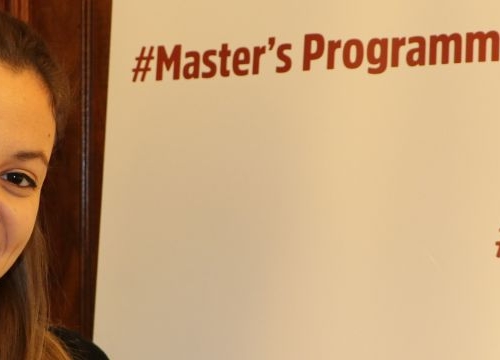Meet our Pictet Team: Melina Fidelis Tzourou


Geneva Academy
2 March 2020
Melina Fidelis Tzourou is enrolled in our LLM in International Humanitarian Law (IHL) and Human Rights.
From 7 to 14 March, she will travel to Bali, Indonesia to represent the Geneva Academy at the Anglophone Edition of the 2020 Jean-Pictet Competition – along with Chiemelie Michael Agu and Yulia Mogutova.
The Jean-Pictet Competition is a leading IHL competition and one of the most innovative training programmes for students in public international law. This week-long event tests students on their knowledge of and ability to implement IHL, as well as other branches of international law, through role-playing exercises based on a hypothetical armed conflict scenario.
Tell us about your Background
I come from Greece and I obtained my law degree from the National and Kapodistrian University of Athens in 2018. Before attending the LLM at the Geneva Academy, I worked at a military law firm, dealing with court-martials and military tribunals and other legal cases as well. In 2018 I also carried out an internship with the International Committee of the Red Cross in Greece, focusing on migration and the Greek legal framework governing the issue of unidentified deceased migrants.
Why this Interest in Studying IHL and Human Rights?
A professor in law school once told me ‘if you want to change the system, you need to know the rules very well’. I have always felt a very passionate drive towards battling injustice and humanitarian assistance and I realized that if I wanted to accomplish either of the two, I would need to be well versed in the relevant legal regimes. Admittedly, I am more interested in the field of IHL than human rights, as I believe it offers more opportunities to work in the field, away from courthouses and desks, which I don’t get along with that well.
What Motivated you to Participate in the Jean-Pictet Competition?
Precisely because of my aspiration to work in the field, the Jean-Pictet Competition felt like the ideal setting for me. The competition aspires to take the law out of the books and simulate life-like situations. This was extremely appealing for me, as I really yearned for some practical training on the topics I have, so far, only been exposed to theoretically.
How was the Selection Process for the Geneva Academy’s team?
The selection process consisted of a written component and a mock simulation. While none of the two stages in and of themselves were particularly demanding time-wise, it was very tricky to comprehend precisely what was required of you and it was definitely unlike any other selection process I have been through before. Understandably, I was quite excited when I found out that I had been selected, as I had heard about the Jean-Pictet Competition before and was really looking forward to being given a chance to participate in it.
How is the Preparation?
Preparing for the competition can be challenging at times, as we are requested to conduct a more in-depth and detailed analysis of topics that we already studied in class. Apart from this, we then have to present the knowledge we acquire in a cohesive and collective way, as a team, and this can also be challenging. Overall though the experiencing is very rewarding since you get to test the knowledge you acquire through the practical simulations that we have every week and it is quite exciting to feel that you have correctly internalized and applied certain information. We are also lucky to have an amazing coach! He can be strict when needed but he has an amazing capacity for imparting knowledge and his guidance has been extremely helpful, not only for the competition but for the LLM as a whole!
A Challenging Moment in your Preparation?
I think for me, the most challenging moment in our preparation is to understand the exact requirements of our simulation tasks each time and getting into the relevant mind-set. But I think this is also one of the most educational aspects of the preparation, that it forces us to think critically and develop a multi-faceted way of functioning.
And a Funny one?
It’s hard to think of one specific moment. Overall, because during the simulations you have to pretend to be all sort of different characters, sometimes it can be very funny to see yourself and your teammates assuming all of these crazy roles. Even if you want to laugh though, you can’t. That makes it even funnier!








